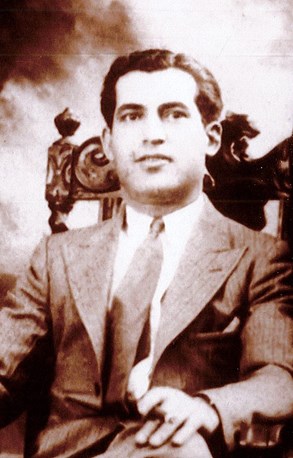
Some of my father’s principles took hard lessons to learn. Like the time my buddy, Elmer, and I wanted to go to the picture show at the Byrd Theatre. We needed ten cents for two tickets. I had three pennies, a pair of dice, and a plan. We headed behind the Monticello Hotel and struck up a game of craps with an older boy who was selling newspapers. The dice fell my way at first, and I won five cents—two more to go. I shook the dice hard, blew on my hand, and rolled. Damn! An eight. I grabbed the dice. “I won,” I declared.
“No, you didn’t.” The boy dropped his papers and squared his shoulders, standing much taller than me.
I wanted that money so bad that everything my parents had taught me seemed to flow right out of my head. I popped him before he was set, and he dropped to the ground. The alley filled with spectators. I hit him again. Every time he got to his knees, I landed another punch. I refused to let him stand because I couldn’t look him in the eyes. A cab driver stopped, jumped out of his car, and pulled me back. The kid staggered to his feet, then straightened and clocked me one while the cab driver held my arms. My eye swelled instantly. I struggled to break free.
People yelled and screamed in a circle around us. A policeman hurried over and broke up the fight. The driver returned to his cab, and the boy gathered his papers. Elmer and I went on to the theater and watched a cowboy movie. Between the swelling and the regret, it was hard to enjoy the show.
I walked home, and my father met me on the porch. He motioned toward my face. “What happened to you?”
“Nothing.” I lowered my head and tried to step around him.
He blocked the way and lifted my chin. “It don’t look like nothing.” He asked me who I’d been with, and I told him, wanting nothing more than to go inside and hide. My daddy yelled for my brother Manny to get Elmer and bring him to the house. Manny did so, and they arrived a few minutes later. Elmer looked like he’d rather be anywhere else. My father demanded to know what had happened. Elmer told the story, but skipped the cheating part.
“Eddie was winning the fight,” he said. “Until that cab driver held him back.”
My daddy grabbed my arm. “We’re going downtown,” he said. We marched toward the hotel, his hand heavy on my arm. We stopped when we reached the taxi stand at Granby Street and waited for the first cab to pull up. “That him?” Papa asked. I shook my head.
“That one?” he asked as the next cab arrived. No, again.
“Him?”
I nodded, sick to my stomach.
The driver got out and opened the door. “Taxi, sir?”
My daddy asked him if he’d ever seen me before, and the driver nodded. “Don’t you ever grab hold of one of my kids,” he yelled, then pummeled the driver right there on the street. “Hurt one of my kids again,” he said as he slammed the man against his cab, “and I’ll kill you.”
We turned and walked away. Shame worked its way into my muscles. I stared at the bricks of the sidewalk, unable to raise my head, and listened to my father’s heavy breath. He would have whipped me if he knew that I had cheated that kid, and then hit him when he was down, but he never learned the truth. For me, there was no escaping it.
My eye healed, but never my regret.
Years later, when my contracting business was showing its first signs of success, the Monticello Hotel came up for sale. I wanted to buy it in the worst kind of way. I had such vivid memories, my shame about cheating that kid, my daddy beating that driver, and the lie that I couldn’t take back. My emotions got all mixed up with my thoughts. I believed that if I bought the building, I could change it somehow, make everything right.
My brother’s brother-in-law came to me as soon as he heard that I was considering making the purchase and said that the hotel was a loser. He convinced me that it was business, and I couldn’t allow my emotions to make the choice. He was right of course. It was a bad deal, and I couldn’t make things right by buying the building. I could only do my damnedest to never let my wants override my principles ever again.
My daddy’s example had been clear. There were things a lot worse than being a little hungry or a little cold or not having the extra pennies to go to a picture show, no matter how badly I wanted to see it. Papa may have bucked the system, everyone did during Prohibition, but he never cheated someone out of what was rightfully theirs. I decided on that long painful walk back from Granby street, with my eye throbbing and shame heavy on my heart, that the way to be happier in life was to practice what my daddy had preached.
